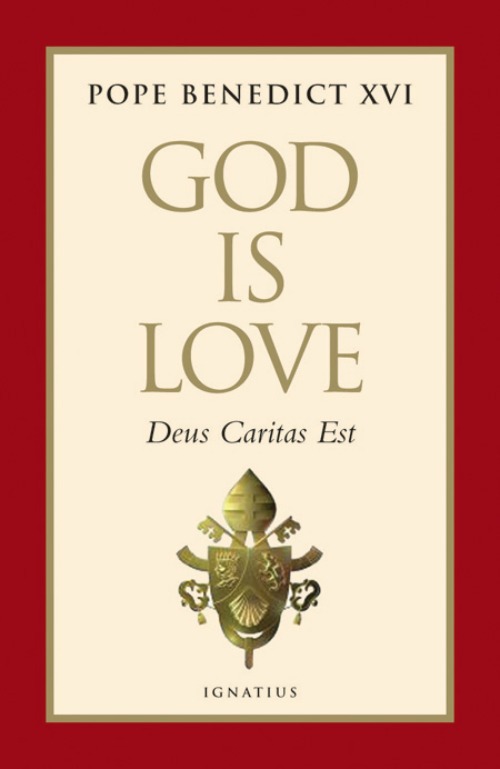God Is Still Love: Benedict XVI’s ‘Deus Caritas Est’ After 10 Years
Encyclical Provides Theological Basis for Francis’ Papacy

All encyclicals are born equal, but they don’t age equally well. Upon publication, a new encyclical is widely reported, and attention is paid throughout the world of Catholic media and scholarship.
Yet with the passage of time, most encyclicals diminish in importance, and some are rarely read anymore. Think of Pope Benedict XVI’s Spe Salvi (Christian Hope), which has disappeared almost without a trace.
Relatively few retain enduring influence. Those that do are indicated as the anniversaries roll around; they are marked by conferences, commemorative lectures and articles.
Deus Caritas Est (God Is Love), the first encyclical of Benedict XVI, has grown in importance in the 10 years since it was issued — dated Dec. 25, 2005, it was released on Jan. 25, 2006. Cardinal Gerhard Müller, prefect of the Congregation for the Doctrine of the Faith, gave a major lecture on Deus Caritas Est on Feb. 1 in Houston, and an international conference was held in Rome on the same topic at the end of February.
Deus Caritas Est has become more important over the decade, as it provides the theological foundation for the pontificate of Pope Francis, establishing its continuity with his two predecessors. It might be thought odd to look to Benedict to explain Francis, but as Cardinal Müller noted in Houston, the former is a “teacher of theology,” while the latter focuses on “pastoral praxis.” Much of the confusion about understanding Francis arises from attempting to put a theological framework upon statements — “he is not Christian” — which are theologically incorrect but express a valid pastoral intuition.
“It is impossible to separate the theological knowledge of God from pastoral charity,” said Cardinal Müller in Houston. “Deus Caritas Est is aimed at evangelization; to make present the love of God in the world is to make the light of God present in the world.”
Benedict’s argument has been given fresh impetus by Francis, whose pastoral heart manifestly beats with love for the poor and the afflicted. Indeed, the argument of Deus Caritas Est — that Christian charity makes Christian faith present in the world and makes it attractive to others — explains the twin emphases of Pope Francis on love for the poor and for an urgent sense of mission. Both Benedict and Francis agree that the works of charity and mercy belong at the very core of the Church’s identity.
“The Church’s deepest nature is expressed in her threefold responsibility: of proclaiming the word of God (kerygma-martyria), celebrating the sacraments (leitourgia) and exercising the ministry of charity (diakonia),” wrote Benedict in one of the key passages of Deus Caritas Est (25). “These duties presuppose each other and are inseparable. For the Church, charity is not a kind of welfare activity which could equally well be left to others, but is a part of her nature, an indispensable expression of her very being.”
Toward the end of St. John Paul II’s pontificate, he turned toward the fundamentals of Catholic life after two decades of addressing the various controversies that had beset the Church after the Second Vatican Council. He wrote major documents on contemplating the face of Christ, the Rosary and the Eucharist.
When he died in April 2005, work had already begun for an encyclical on charitable service. This was a fundamental aspect of the Church’s mission, which had been neglected in the various doctrinal and liturgical disputes that had consumed the Church’s energy.
Benedict took up this unfinished work, added a deeply theological reflection on the nature of love, and presented it to the Church as his first encyclical. For a pope widely acknowledged to put great priority on the liturgy, it bears remembering that he taught that charitable service was equally part of the Church’s mission.
In Houston, Cardinal Müller presented Deus Caritas Est’s argument that making God’s love authentically present is an effective means of proclaiming the truth about God. Hence the importance of marriage, which, as “an icon of divine love” — lifelong, faithful, complementary and fruitful — is a means of revealing the truth about God.
The Church’s insistence on protecting marriage is thus both a charitable service and an illumination of God’s own loving nature.
Deus Caritas Est gave rise to some of the more important, if overlooked, reforms of Benedict’s papacy. Following the lead of the encyclical, the statutes governing the Church’s charitable agencies were revised to ensure a greater harmony between the Church’s charity and her proclamation of the truth.
When Francis began his pontificate by stating that without Christian truth the Church becomes a “diabolical NGO [non-governmental organization],” the language was more dramatic, but the point was exactly the same.
Deus Caritas Est thus serves to unite three pontificates — and to provide the theological heft for the current one. Ten years on, it’s one that will last.
is editor in chief of Convivium magazine.
He has been appointed to serve as a jubilee year missionary of mercy by the
Pontifical Council for the Promotion of the
New Evangelization.
- Keywords:
- March 20-April 2, 2016

















